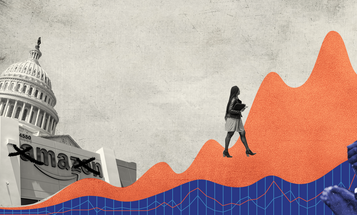
How Biden’s Plan for a Public Credit Registry Will Build Economic Power for Black and Brown Communities
One way to build economic power for Black and brown households is to recognize that access to consumer credit is a public good and to replace the private companies that now control credit reporting.

Credit reporting is one of the many economic systems that dictates the rules and limits the life choices of Americans [...]
Among President-elect Joe Biden’s boldest policy proposals is the plan to establish a public credit reporting agency, based on policy developed by Demos. In the midst of a global pandemic and national economic collapse, remaking the nation’s credit reporting system is not the top concern for most Americans. Yet credit reports and scores are used to control access to things people still care about deeply: Having good credit determines how much we’ll have to shell out each month in interest on credit cards and other debt, and whether we can buy a car, be approved for a mortgage, get a loan to start a business, or even land a job. Credit reporting is one of the many economic systems that dictates the rules and limits the life choices of Americans—and that puts Black and brown households at a structural disadvantage.
One effective way to build economic power for Black and brown households is to recognize that access to consumer credit is a public good, necessary to everyone’s flourishing, and to establish a new public institution to replace the private companies that now control credit reporting. The Biden administration should establish a public credit registry (also known as a public credit reporting agency) that will put equity at the center of its decision-making and enable Black and brown people to exercise greater control over their own economic lives.
Yet these metrics cannot be race-neutral because they draw on data about personal borrowing and payment history that is shaped by generations of discriminatory public policies and corporate practices.
The credit reporting system was developed as a tool for lenders to evaluate would-be borrowers, determining who is most likely to pay back a loan and, accordingly, how much interest to charge. It’s true that credit scores never formally take race into account. Yet these metrics cannot be race-neutral because they draw on data about personal borrowing and payment history that is shaped by generations of discriminatory public policies and corporate practices.
From the American economy’s earliest roots in chattel slavery that treated Black people as property to more recent policies like redlining, Black and brown families have been systematically excluded from wealth-building opportunities that benefitted white families. Exclusion produced vast wealth inequality that is only growing deeper: For every dollar in wealth held by the typical white household, the typical Black household has just 10 cents, and the typical Latinx household has just 12 cents. It is little surprise that, locked out of wealth passed down across generations, Black and brown consumers now disproportionately show up in the data as worse credit risks. And because consumers with poor credit are more likely to be denied loans or charged higher interest rates, the cycle of disadvantage reinforces itself.
A public credit registry would enable consumers to hold this vast power to account, shifting a strategic bit of economic control from corporations to communities.
Transforming credit reporting is far from the only step needed to address racial economic inequity. Yet the importance of credit reporting cannot be dismissed: As a gatekeeper for access to housing, transportation, employment, and other necessities, credit reporting is part of the nation’s essential infrastructure. Credit reports on more than 200 million American consumers are controlled by three unaccountable private companies—Equifax, Experian, and TransUnion—that hold consumers at their mercy, collecting personal borrowing and payment data without consumer consent, evaluating it according to secret metrics, and even failing to invest in processes to verify data accuracy. By commanding a slice of the nation’s infrastructure, these firms exercise arbitrary power over Americans’ lives and life chances, putting Black and brown consumers at the greatest disadvantage. A public credit registry would enable consumers to hold this vast power to account, shifting a strategic bit of economic control from corporations to communities.
Currently, the algorithms that determine credit scores are trade secrets owned by private companies.
As a public institution with a mandate to operate in the public interest, the public credit registry would shift power in a number of ways. First, remember the old adage that knowledge is power. In this case, the knowledge is exactly how credit scores are determined. Currently, the algorithms that determine credit scores are trade secrets owned by private companies. As a result, consumers never fully understand how actions like paying a bill late or taking out a loan will affect consequential determinations about their financial futures. Under the public credit registry, the algorithms used to determine creditworthiness will be publicly available with clear explanations of what consumers can do to improve their credit. Credit reports and scores, which are based on information about our activities, will be free to consumers at any time. The credit registry will educate consumers about credit products and how to develop and maintain a good credit score.
New credit reporting algorithms could draw on data sources beyond lending, when these data have been publicly shown to be predictive and to minimize racial disparities.
To build economic power, Black and brown consumers need not only more transparent criteria, but credit scores that encode as little historic discrimination as possible. The credit registry will seek public input on the development of new transparent algorithms for predicting creditworthiness with a goal of minimizing disparate racial impact. New credit reporting algorithms could draw on data sources beyond lending, when these data have been publicly shown to be predictive and to minimize racial disparities. Data sources could include allowing consumers to opt into reporting bank account data, rental payments, or utility data in order to have a more extensive credit file. A commitment to shifting power demands that alternative data sources be used only when consumers opt in to place greater control in the hands of consumers.
In addition to drawing on new data sources, the public credit registry will research proposals to exclude certain adverse credit data from credit reports and scores, for example medical debt or payment delinquencies on predatory credit products, which are disproportionately targeted at Black and brown communities.
Demos’ plan for a public credit registry includes mechanisms for consumers to hold the agency itself accountable for providing full and accurate information, resolving disputes efficiently, and protecting the security of consumer data. Overall, the proposal shifts power away from the handful of secretive companies that today disproportionately shape consumers’ financial prospects to consumers and their communities, providing tools for Black and brown consumers, who have been impacted the most by economic exclusion, to gain real control over the financial decisions that impact their lives.




